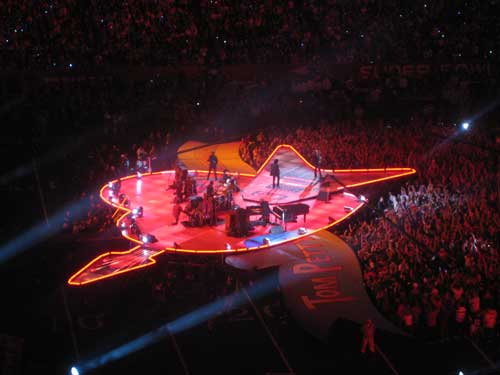Due to budget cuts, Arizona State Parks is closing 13 of its 22 state parks. This last week, I have been making the rounds of the state government, from the state legislature to the head of Arizona State Parks, with a proposal to keep the 7 largest of these closed parks open, and pay the state money for the privilege. Unfortunately, we have had only mixed success with a proposal that seems to me to be a win-win for everyone. Our local newspaper editorialized against my proposal, without even knowing the details (my response here). So in this post, I am going to give the details of our proposal, and solicit your feedback, especially those of you in Arizona. All I ask is that you read the whole thing, and not just leap into the comments section having just read and reacted to (positive or negative) this first paragraph about private operation of public parks.
Background
Our company, Recreation Resource Management (RRM), is over 20 year old, and we operate over a hundred public parks under concession agreement for the US Forest Service, the National Park Service, the Tennessee Valley Authority, California State Parks, and many others. Traditionally, park concessions used to be limited to private companies running the gift shop or the bike rental inside a park. And we do some of that (for example we run the store and marina at Slide Rock and Patagonia Lake State parks). But our preferred niche has always been to run entire parks on a turnkey basis. We run a huge variety of facilities that largely parallel anything we might find in the Arizona State Parks system -- including campgrounds, day use and picnic areas, boat ramps, hiking trails, wilderness areas and historic buildings. The largest parks we run are twice as busy as Slide Rock or Lake Havasu and four times as busy as any of the parks we are proposing to manage. We currently run parks today literally right beside some of these Arizona State parks. All of this is to say that the parks in Arizona are absolutely normal and typical resources that we manage.
A concession contract works much like a commercial lease. We sign a contract allowing us to run the park for profit, and then pay the state a rent in the form of a percentage of fee revenues. The typical operating agreement includes over 100 pages of standards we must conform to, from fee collection to uniforms to customer service to bathroom cleaning frequency to operating hours.
Our Proposal
At all of my meetings this week I made three offers, each of which we were willing to commit to immediately (we could actually be up and running with about 21 days notice):
- RRM offered to keep some or all of six parks open out of thirteen on the current closure list. These parks are Alamo Lake, Roper Lake, Tonto Natural Bridge, Lost Dutchman, Picacho Peak and Red Rocks (park but not the environmental center). Not only could these stay open, but we could pay rent as a percentage of fee revenues to the state, money that could be used to keep other operations open. While these parks represent about half of the closure list by number, by visitation they represent well over 90% of the closure list. Combined these parks had a net operating loss of $659,000 to ASP, which we propose to turn into a net gain for the parks organization.
- RRM offered to operate five parks that are currently slated to stay open but where we could pay rents that are higher than the net revenue figure ASP showed for FY2009. These parks are Patagonia Lake, Buckskin Mountain, Dead Horse Ranch, Fool Hollow and Cattail Cove. Combined, this group of parks lost money for ASP in 2009 which we propose to turn into a solid net gain.
- While we would need to do more study, RRM suggested it might take on some of the smaller, money-losing parks beyond those mentioned above if they were packaged in a contract with some of the other parks listed above
To avoid problems with the procurement process, we offered to take as short as a 1-year contract to give ASP time to prepare a longer-term bid process. We also agreed to maintain all current park fees for the next year without change (in contrast to ASP current plans to raise fees), and agreed that no fee could be changed without ASP approval. The only help we asked for was
- We perform rules enforcement, but we need law enforcement backup form time to time
- We perform routine maintenance and keep the park safe and attractive, but many of these parks have substantial deferred maintenance problems that we cannot take on with only a 1-year contract (but would be willing to invest capital to repair under a longer term arrangement)
And if the ability to keep almost half the parks slated for closure open was not enough of a value proposition, we proposed one additional benefit. Any parks that are put under private concession management immediately cease to be a political football. For years, parks organizations have closed and opened parks in a game of chicken with legislators, with the public as the victim. Parks under private concession management no longer are subject to such pressures, as they are off the budget. Back in the 1990's, when the new Republican Congress squared off with President Clinton over the budget, the government was shut down for a while, including all federal recreation facilities -- EXCEPT those under private concession management. We got calls from the media saying, why are you open? To which we replied -- hey, you have now discovered one benefit of private concession management -- the parks we manage are no longer political pawns.
Reactions
So far we have had really good and positive reactions from Arizona legislators (I have not been able to see any of the Governor's staff).
The reaction from Arizona State Parks has been more muted. While they are publicly open to all proposals, in reality this is the absolute last thing most of their organization wants to do (you should see the body language in some of our meetings, it is a lot like trying to sell beer at a Baptist picnic). They have not said so explicitly, but from long history with this and other parks organizations I can guess at some of the issues they have:
- Distrust of and distaste for private management runs deep in the DNA of the organization. Many join parks with a sense of mission, seeing unique value to public ownership of parks and lands. I attempt to explain that this value still exists, that what they are turning over is operations, not management and control, but I don't get very far. I try hard to give the new management of Arizona State Parks a clean slate, but I can't help but be affected by something I saw their previous director say. Back in about 2004 we hosted a breakfast at a convention of state parks directors up in Michigan, I believe. Someone must have forgotten to throw us out of the room, because we witnessed the head of Arizona State Parks stand up in front of his peers and demand that they all hold the line against private management as one of their highest priorities. It was made clear that state organizations that stepped out of line would incur the wrath of other states. This summer we participated in a series of meetings in California called by Ruth Coleman, who is the head of the parks organization there and someone I admire. She was trying to break the organization out of its old culture, but it was very clear in roundtable discussions that the rank and file would rather see the parks closed to the public than kept open using private concession management.
- I mentioned earlier that private management brings a benefit to the public of keeping the parks from being a political football. But the parks organization feels like it needs that football. Without the threat of park closures, it feels like its budget will be gutted like a fish. And, now that its budget has been gutted, it still holds out hope its money will be restored and needs the park closures to keep up the pressure. As long as there is even the slightest hope of budget restoration, a hope which I am pretty sure will "spring eternal," my proposal, no matter how much it makes sense for the people of Arizona, will never be adopted.
Again, these are just guesses. Renee Bahl of Arizona State Parks has told me they are open to all new ideas, and I will take her at her word.
Libertarian Concerns
Those of you who know me to be a libertarian might wonder how I function in this environment. The answer is, "with difficulty." I have a strong philosophic passion to bring quality private management to public services, and this opportunity is a good one. And I am not adverse to making money while doing so. But I am adverse to rent-seeking, and there is admittedly a thin line between trying to make positive change and rent-seeking in this case.
I generally avoid this by insisting on short initial contracts (in this case 1 year) to prove out the concept and to allow time for the public agency to figure out how to put this beast through a procurement process that probably was not well designed for this type of thing. This is what I did when the US Forest Service approached us with an idea to bring private management to the snow play area at Wing Mountain near Flagstaff. We took it on a one-year contract (which grew to 2 years) and then the contract went out for public bid - which we won - for 10 years. We are very good at what we do and are not at all afraid to compete. The only time I will not compete is when I perceive someone has a political connection that gives them an inside track. After two or three losses in Florida counties to a company with no experience but a brother-in-law on the County commission, I realized it was just a waste of time to bid on these situations.
Conclusion
Please give your reactions and concerns in the comment section. For those who disagree with private management of public resources, I will be honest and say you are unlikely to change my mind, as I have dedicated all my time and my life savings to the proposition. But you may help me better understand and tailor our service to address public concerns. I will try to keep the FAQ below updated based on what I am seeing in the comments. If you are in Arizona and know someone you think I should be talking to, drop me an email at the link above.
FAQ
Does your company take ownership of the park? No. The parks and all the facilities remain the property of Arizona State Parks. We merely sign an operating lease, with strict rules, wherein we operate the park, keep the fees paid by the public, and pay the state a "rent" based on a percentage of the fee collections. Even when we invest in facilities, like this store building and cabins, they become the property of the public at the end of the contract.
How can the state afford to pay you if they have no budget? We are not paid by the state, and receive no subsidy. 100% of our revenue is from fees paid by visitors to the park we operate. If we don't run a good operation that is attractive to visitors, we don' t make any money.
Doesn't the state lose out if you keep all the fees? No. Mainly because in all the parks we have proposed to take over, the state has net operating losses of up to $200,000 or more a year. By taking over the park, their losses go away AND they receive extra money in the form of rents we pay. We are able to do so because we have developed efficient processes for managing campgrounds and have a flexible and dedicated work force.
Are you going to build condos and a McDonald's? No. The fact that this is such a common question is amazing to me, as we operate over 100 parks in this manner across the country and you would not be able to tell the difference between the facilities we manage and any other public park. Under the terms of our operating contract, we cannot change fees, facilities, operating hours, or even cut down a tree without written approval form the parks organization.
Are you going to just jack up fees? No. We have committed in our offers to keep fees flat for the next year. We cannot raise fees without state approval, and we work hard to keep public recreation affordable. Last year was a very good year for us because, in a recession, our low-cost recreation options gave many families on a budget a chance to have a quality recreation experience.
Why just a one year contract? We would actually prefer a longer contract, as this allows us to actually make approved capital improvements to parks (for example, we have installed many cabins in public parks we operate). However, we have offered to take these under an initial contract that is just long enough to allow longer-term contracts to be fairly offered on a competitive bid basis.
Maybe no one trusts you because you are small and unproven? Well, perhaps. But last year our total fee revenue was nearly $11 million, making us slightly larger than the Arizona State Parks system. We have a proven record with decades of positive performance reviews from government agencies around the country. For example, for those of you form Arizona, if you have stayed at a US Forest Service developed campground near Flagstaff, Sedona, Payson, or Tucson, or sledded at Wing Mountain, you probably have stayed in a facility we operated. We already operate two concessions in Arizona State Parks, and have a great record working with the organization.







